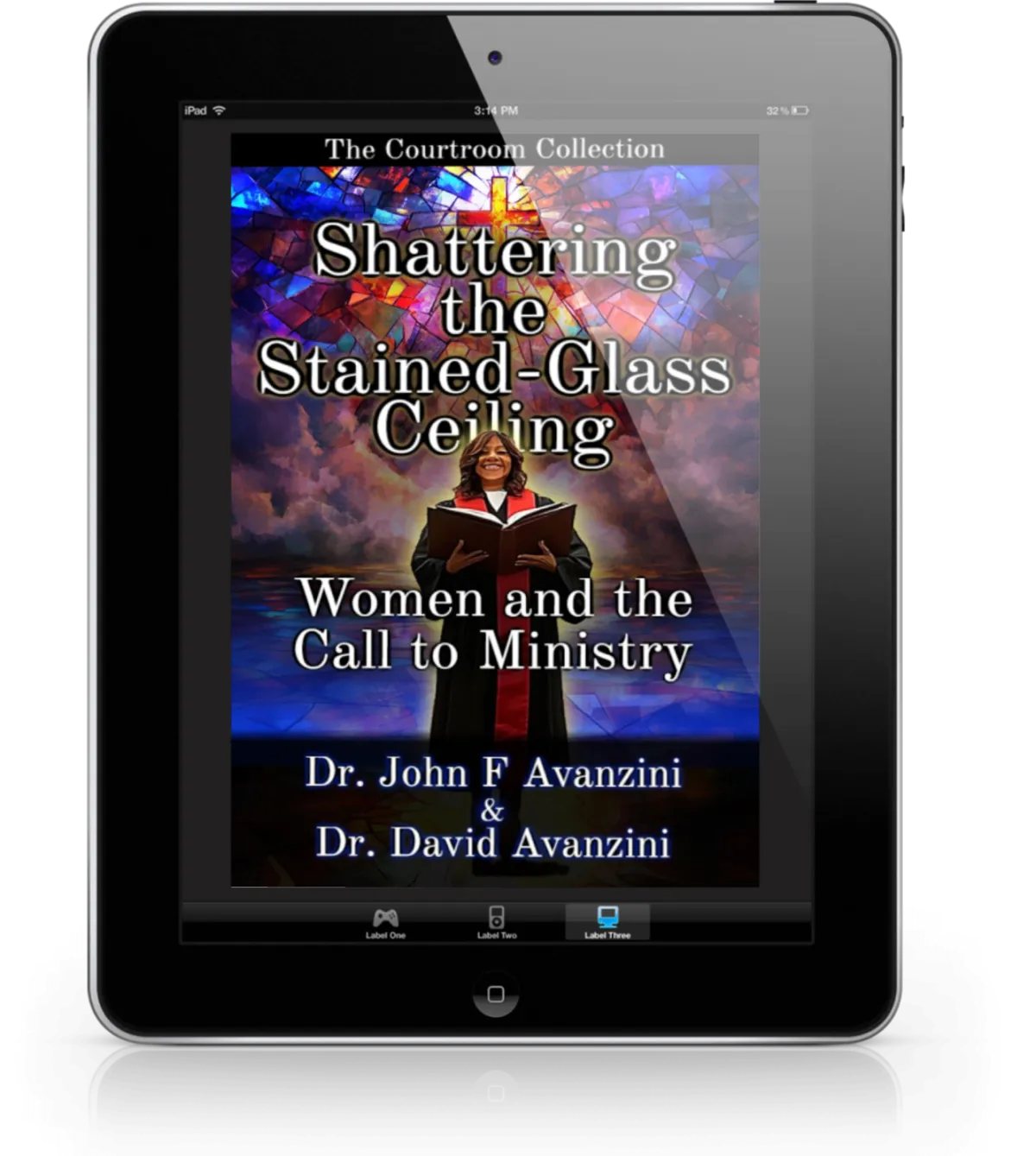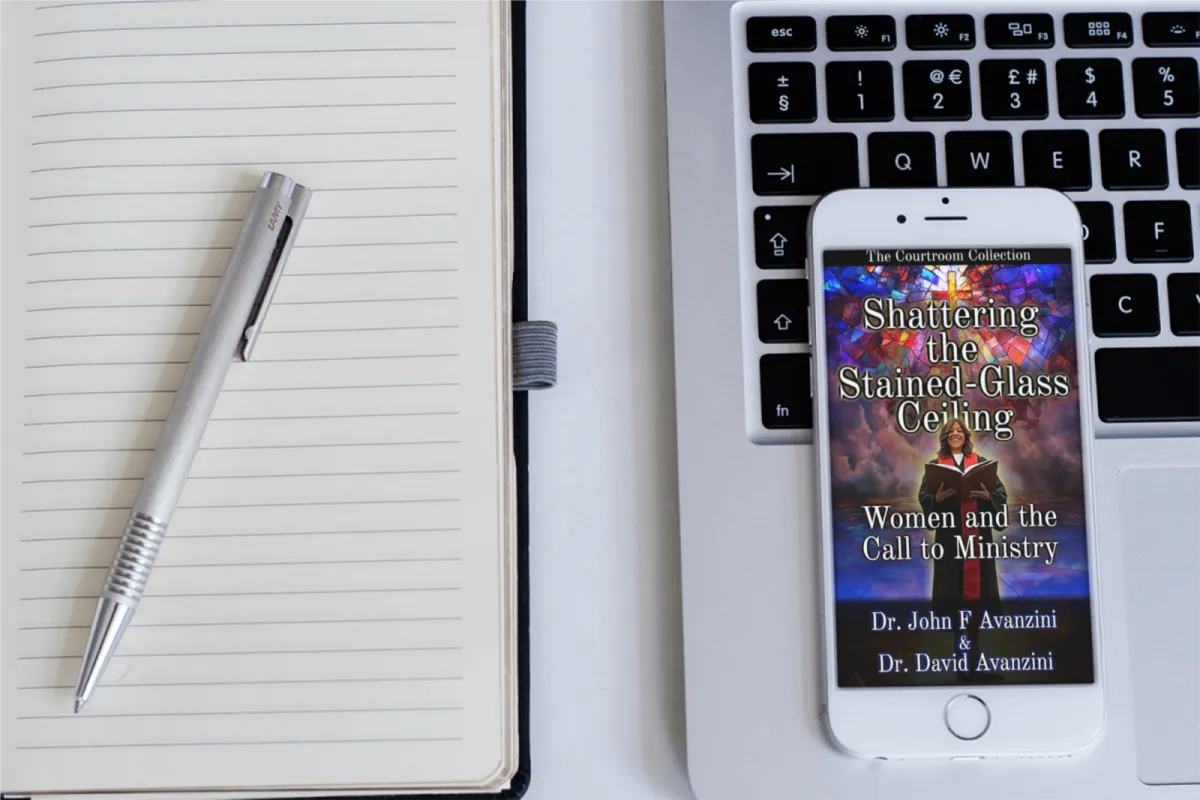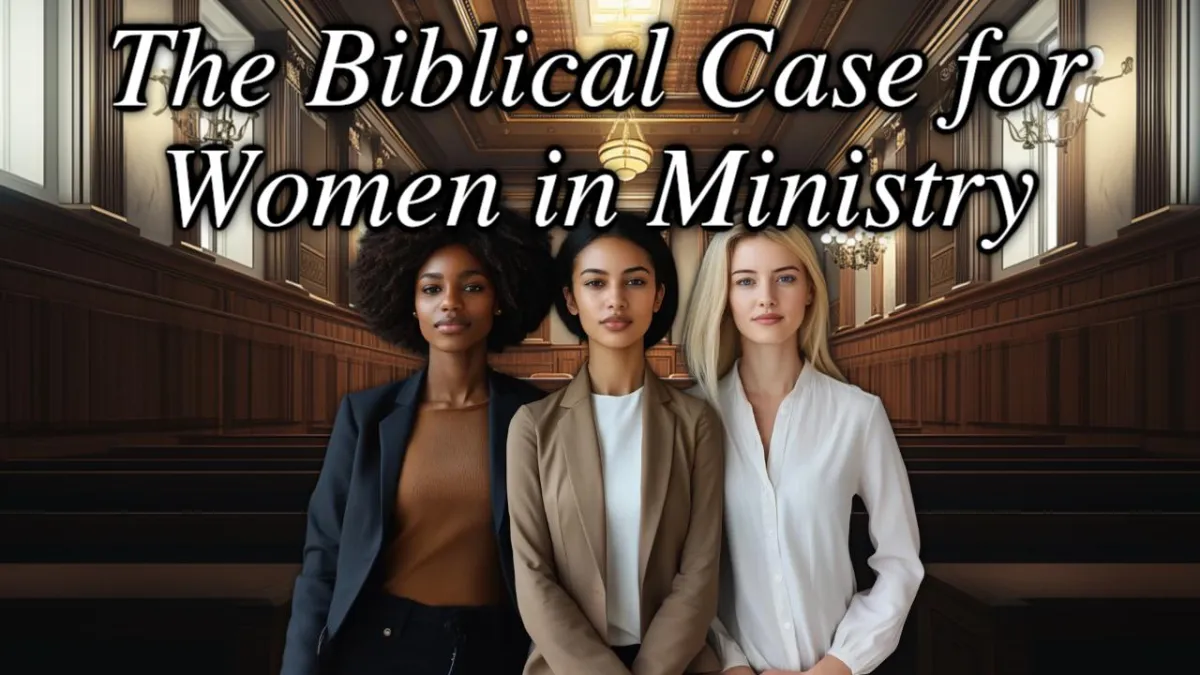
It Is Time For The Church to Really Have Clarity On This Most Important Subject
Pre Order Available Mid April
Dive into this captivating first chapter and discover how you can access the entire book for free. click the button below for more information

Shattering the Stained-Glass Ceiling: Women and the Call to Ministry
Chapter 1:
The Weight of Tradition and the Subjugation of Women
The subjugation of women is deeply rooted in societal hierarchies and religious traditions. Throughout history, women have often been relegated to secondary roles, their voices marginalized by patriarchal structures justified by cultural norms and religious doctrines. This chapter will examine the historical origins of this inequality, the systems that sustained it, and the challenges women have faced in seeking equality. Through an analysis of the intersection between cultural and religious traditions, we will examine the evidence and delve into the debate: does the historical record indicate that men and women were originally meant to stand as equals, or is this idea a modern reinterpretation of the past?
The Historical Context of Oppression
To understand the bias against women, we must first look to history. Ancient civilizations such as Greece, Rome, and China were built upon systems that viewed women as property. Marriage was less about partnership and more about transaction—a tool for securing alliances, wealth, or social status. Laws were crafted to enforce this view, stripping women of legal rights and autonomy. A woman’s worth was tied to her ability to bear children, maintain a household, and serve her husband.
From a secular lens, this systemic oppression can be seen in the laws and customs of these societies. For example, Roman law classified women under the guardianship of their fathers or husbands, denying them freedom of choice. In China, Confucian teachings emphasized the “Three Obediences” for women: obedience to their father, husband, and son. These cultural norms codified inequality and left women without a voice.
The bias against women has not been confined to secular traditions; it is also evident across various religious institutions worldwide. Across many faiths, sacred texts and doctrines have been interpreted or manipulated to uphold gender inequality. In numerous religious contexts, scriptures have been taken out of context or shaped by societal norms that prioritized male dominance. This misuse of religious teachings has been a significant barrier to achieving gender equality throughout history, spanning cultures and belief systems.
Women as Property
One of the most glaring examples of systemic inequality is the treatment of women as property. In both secular and religious traditions, marriage was often a transaction. A woman was handed from her father to her husband like a commodity, her value measured by her dowry or her ability to produce heirs.
This reduction of women to property had devastating social and psychological impacts. Stripped of their autonomy, women were left vulnerable to exploitation. They were denied education, legal rights, and opportunities to contribute meaningfully to society. The narrative of being less-than became so ingrained that many women accepted it as natural, a fate ordained by God or society.
Religion as a Tool of Control
Religious traditions, while offering hope and guidance to many, have also been used to justify inequality. Throughout history, women were excluded from leadership roles in religious institutions and were often silenced in matters of theology and worship. Practices that relegated women to subservient roles were framed as divine mandates, leaving little room for questioning or reform.
This abuse of religion is especially evident in historical accounts of women being exploited within religious ceremonies. In some cultures, women were offered as sacrifices to appease deities or were subjected to sexual exploitation under the guise of religious rituals. These practices were often rationalized as necessary for the greater good or divine will, further entrenching the belief that women existed to serve others.
Religious institutions have also resisted change, holding tightly to traditions that reinforce patriarchal structures. Even as societies began to embrace progress and equality, many religious leaders clung to interpretations of sacred texts that justified the status quo. The silence and complicity of these institutions allowed systemic inequality to persist, generation after generation.
Breaking Free from Tradition
Despite the weight of tradition and the barriers it creates, women have consistently resisted subjugation, challenging ingrained biases that are both socially and psychologically complex. According to Baylor University's 2015 study, Cognitive Barriers to Learning, relearning something incorrectly internalized often requires repeated exposure to new ideas. This is because the brain tends to reinforce existing beliefs, making it difficult to unlearn deeply rooted misconceptions—especially those tied to traditions passed down through trusted, loving relationships.
Consider the beliefs taught to you at a formative age by a Sunday school teacher or a cherished family member—individuals who cared deeply and instilled teachings they believed to be true. Over time, these ideas are reinforced by other respected figures, making it incredibly difficult to question them. How could those who loved you so deeply have instilled something that might be flawed? Breaking free from such traditions requires an authority strong enough to challenge these ingrained beliefs and reveal the truth. In my experience, this authority is the Word of God. While many traditions stem from Scripture, understanding the context and broader evidence surrounding these teachings is essential to rightly interpreting the Word and uncovering a deeper, more accurate truth.
From a young age, many women are taught to accept inequality as natural, embedding these ideas into their subconscious. Changing such deeply rooted beliefs requires consistent exposure to the truth found in the Word of God, rightly divided, which renews the mind and transforms entrenched patterns over time. Those who dare to challenge societal norms and stand on the authority of God’s truth often face resistance, but their faith and courage are vital in breaking the cycle of inequality.History is filled with women who have not only rejected harmful traditions but also reshaped societal expectations, paving the way for others to do the same. Their persistence demonstrates that inequality is not an unchangeable fact, but a human construct that can—and must—be dismantled. By challenging these norms and embracing truth, we have the power to create meaningful change that builds a more just and equitable future.
First in the Natural, Then in the Spiritual
The scripture says, "Howbeit that was not first which is spiritual, but that which is natural; and afterward that which is spiritual." — 1 Corinthians 15:46 (KJV). This verse speaks to a divine order, highlighting that breakthrough and transformation often originate in the natural world before manifesting in the spiritual realm.
Over the decades, we have witnessed extraordinary milestones where women have broken through the proverbial glass ceiling in secular spaces. Consider the corporate world, where women like Mary Barra, the CEO of General Motors, and Rosalind Brewer, the CEO of Walgreens Boots Alliance, have effectively led global companies. Likewise, in politics, Kamala Harris made history as the first female Vice President of the United States, symbolizing unparalleled progress in leadership and governance. Globally, leaders like Angela Merkel in Germany, Jacinda Ardern in New Zealand, and Ellen Johnson Sirleaf in Liberia have demonstrated that women are not only capable but excel in positions traditionally dominated by men.
These examples underscore how the glass ceiling has been shattered across industries and cultures, affirming women's potential and capacity to lead. This shift in the natural realm is a precursor to what can also happen in the spiritual sphere. Just as women have claimed positions of influence and power on earth, we are poised for a similar breakout in the spiritual realm. God's word reminds us of His commitment to equality, purpose, and empowerment for all. If armed with a clear understanding of His promises and truth, we too can overcome spiritual barriers and step into all that He has prepared for us. The natural victories we've seen are but a foretaste of the spiritual breakthroughs that await.
Presenting the Case for Equality
Child of God, as we address gender equality in ministry, it’s crucial to approach this topic with precision and objectivity. The evidence calls for a critical look at both secular and religious traditions, many of which have perpetuated inequality for centuries. Our goal is not to impose conclusions but to present the facts, allowing for thoughtful reflection and informed judgment.
In this book, we’ll explore Scripture through the lens of God’s original intent, showing how these sacred texts reveal that men and women were created as equal partners, working together to fulfill His purpose. This isn’t about following cultural trends—it’s about returning to the principles rooted in God’s Word. We’ll also examine how cultural biases and human traditions have distorted these truths over time, creating barriers that have restricted women’s roles in ministry and beyond. Join us as we present a case for reclaiming God’s design for true partnership.
The evidence reveals that these barriers haven’t just hindered women—they’ve also held back the church and society from flourishing as God intended. Empowering women to step into their God-given roles isn’t just progress—it’s a fulfillment of biblical truth. When women are free to answer their callings, families thrive, communities grow, and the church becomes a stronger vessel for God’s mission.
This isn’t about reshaping Scripture to fit modern views; it’s about rediscovering God’s original design. Men and women as co-heirs of His Kingdom, called to work together for His purposes. By dismantling barriers built by human bias and aligning with His vision, we reflect God’s justice, love, and equity more fully in the body of Christ.
So, I leave you with this: it’s time to examine the evidence and measure it against God’s Word. This isn’t just about correcting past wrongs—it’s about returning to God’s design, where every believer can fulfill their calling. Let us work together with humble hearts and renewed minds, restoring God’s creation to its intended order—a church and world grounded in His perfect design.

Breaking Traditional Barriers
Purchase Your Copy Today
Pre Order Book - Available Mid April
Women are essential to the Church’s mission. It’s time to break the barriers that tradition has placed on their God-given leadership. Equip yourself with biblical truth and be part of a movement that shatters the stained-glass ceiling.
The Biblical Foundation for Equality
Order Your Book Today!
The question of whether women should speak or hold authority in the church has been a topic of debate for as long as I can remember. Some argue it is strictly forbidden, while others fully embrace it; yet, few can clearly articulate God’s perspective on the matter. This book takes an in-depth, analytical approach, examining the issue through a judicial lens and carefully exploring the evidence. Understanding what we believe is essential if we want to truly walk in the authority that comes with it. That’s why it’s so important to uncover what God’s word truly says on this subject. With a clear and thoughtful grasp of His truth, we can confidently explain why we believe what we do about this significant and often misunderstood topic.

Are You Ready to Take This Study to the Next Level
Join us in a courtroom setting to examine the evidence thoroughly!
One Book with 100 pages is not going to bring total clarity to this subject for some. For those people, we ask you to take the course: The Biblical Case for Women in Ministry and get a much more in-depth view.
